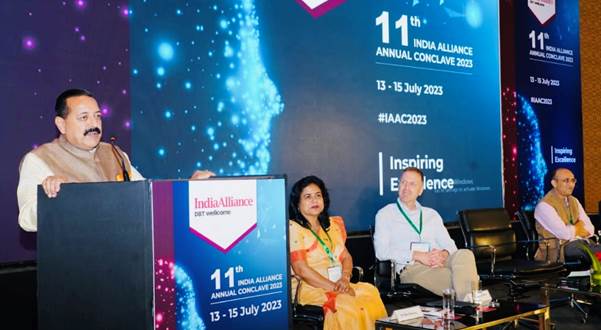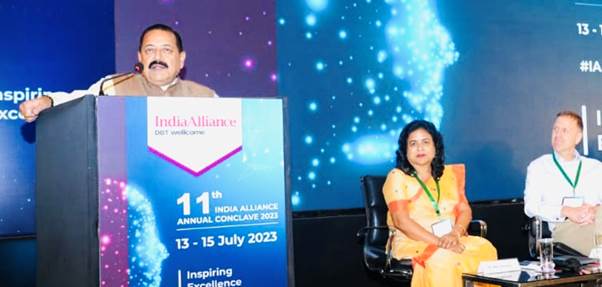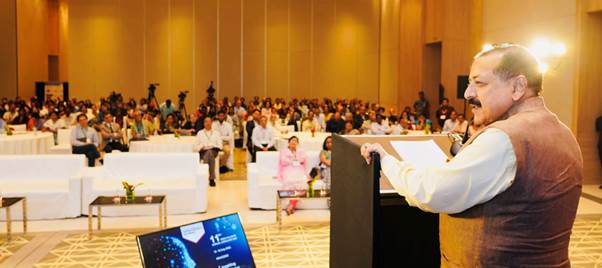Union Minister Dr Jitendra Singh says Chandrayaan will herald India’s quantum leap in the global arena. After India’s success story of Covid vaccine, it is the Chandrayaan-3 mission which will not only reiterate India’s indigenous capabilities but will also firmly place India as a global player to reckon with
Union Minister of State (Independent Charge) for Science and Technology, MoS PMO, Department of Space, Department of Atomic Energy, MoS Personnel, Public Grievances and Pensions, Dr Jitendra Singh today said, after Covid vaccine, Chandrayaan-3 will herald India’s quantum leap in global arena and after India’s success story of Covid vaccine, it is the Chandrayaan-3 mission which will not only reiterate India’s indigenous capabilities but will also firmly place India as a global player to reckon with.
Speaking as Chief Guest at the 11th India Alliance Annual Conclave 2023 in Hyderabad, Dr Jitendra Singh said, the Indo-UK Science Conclave being held just on the eve of launch of Chandrayaan-3 tomorrow proves that India’s partnership is sought increasingly by developed countries in several frontier sectors of science and technology.

India Alliance is a unique partnership between Department of Biotechnology, Govt. of India and Wellcome Trust, UK with a focus on building strong, world-class, biomedical research human resources in India at a scale where the country can make a global impact.
Dr Jitendra Singh said, the impactful journey of India Alliance over the last 15 years has strengthened the research and funding ecosystem of India and enabled successful implementations and interventions to bring impactful changes in the biomedical and clinical research ecosystem in the country. He informed that in 2019, on completing 10 years, India Alliance launched the Team Science Grants and Clinical/Public Health Research Centres to find solutions to the problems of modern society requiring interdisciplinary and collaborative research.
Dr Jitendra Singh reiterated that this year, India Alliance is completing 15 years of a successful partnership between DBT, Government of India and Wellcome Trust. He said, through a focus on excellence through generous funding schemes, India Alliance has played a major role in increasing the retention of research talent in India, created a positive impact on Indian researchers’ career progression, professional development, in addition to catalysing an undeniable increase in capacity building, impact on technology, policy and practice.
Dr Jitendra Singh said, India Alliance has also invested in building capacity for research management in Indian research institutions, essential for strengthening India’s research ecosystem. India Alliance has benefitted more than 589 research scientists with its pan-India approach and has funded 137 different organizations in 48 cities across India. Another hallmark of India Alliance is its focus on fostering collaborations, both nationally and internationally, he added.
Dr Jitendra Singh said, the schemes have brought in foreign collaborations from countries such as USA, UK, Australia, and France, thus helping make Indian science and research competitive with global standards.
Dr Jitendra Singh said, India Alliance’s partnership with European Molecular Biology Organization (EMBO), has also supported interdisciplinary scientific meetings in underserved areas of research. He said, through partnerships with Cancer Research UK, African Academy of Sciences, and statement of interest from Swiss National Science Foundation, India Alliance has consistently catalysed international collaboration.

The Minister informed that under the aegis of Team Science Grants and Clinical and Public Health Research Centre grants, India Alliance has further facilitated international and multidisciplinary collaborations, which is crucial to further strengthen the nation’s research capabilities. He added that the recent pandemic has revealed the need to have clinicians who are also trained in carrying out research. As a trained clinician myself, I recognize the role played by India Alliance to bridge the gap between basic, clinical and public health research by enabling more physicians to get into research, he added.
Dr Jitendra Singh said, during Covid, many of India Alliance Grant holders participated in Covid-19 diagnosis and treatment as required by their respective institutions and added that to build clinical and public health research capacity, India Alliance offers Clinical and Public Health Fellowships, and more recently, has introduced the more generous Clinical and Public Health Research Centre Grants.
Dr Jitendra Singh said, another successful venture of India Alliance is the Developing Indian Physician Scientists (DIPS) workshops, which aims to ignite scientific curiosity in young doctors, while promoting an understanding of the frontiers of medicine and related sciences. India Alliance is also committed to strengthening public health research infrastructure in the country. Over the years, India Alliance has supported One Health research, multimorbidity research, cardiovascular diseases, epidemiology of non-communicable diseases such as cervical cancers, diabetes, and research into tribal health.
Dr Jitendra Singh noted with satisfaction that India Alliance’s attempts into strengthening clinical and public health research has started to bear fruit. He informed that Grant holders’ research has influenced therapeutic options for the treatment of severe scrub typhus, unearthed novel methods to evaluate nutrient bioavailability, impacted One Health approaches in rabies research, and developed tele-health interventions for tuberculosis treatment.
A key need of the hour and mandate of India Alliance is promoting science communication and public engagement of science. Science Communication workshops are being conducted throughout the year to sensitise young researchers about the importance of written and oral communication skills in not just advancing their careers but in building public’s trust and support for science.

Dr Jitendra Singh concluded by saying that at the Conclave, India Alliance-funded researchers will present their significant research findings, covering a wide range of topics including biomedical advancements, antimicrobial resistance, infectious diseases, maternal and child health, and veterinary research.
He said, the Conclave will also delve into critical discussions on public engagement initiatives and explore the potential of Artificial Intelligence in healthcare, by fostering collaboration, networking, and visionary dialogues to address key challenges and unlocking new opportunities for innovation and progress.

